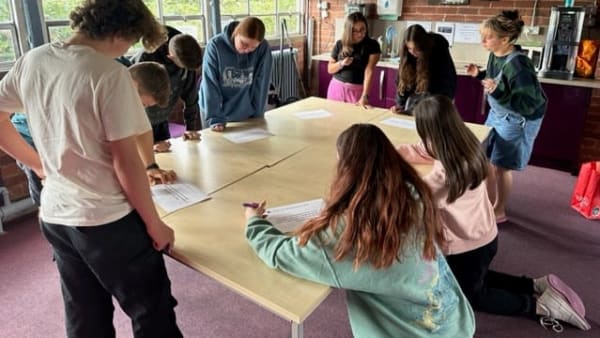In the world of healthy relationships education and sexual violence prevention, a week doesn’t pass without a new focal point for discussion emerging from the media, usually in the form of a disgraced celebrity, or individuals from national institutions such as the Met Police and the NHS. The routine is well established: media splash carrying accusations of sexual assault or harassment, followed by doubters and believers fighting it out across social media. It is as exhausting as it is ugly.
But this process is largely misplaced. Singling out a high-profile figure, while essential for accountability and justice for victim-survivors, can perpetuate the false idea that the main problem is at the hands of a few ‘bad apples’ – people whose actions are totally detached from us and not part of a shared reality. We need to look at the bigger picture and we need to talk about the culture that fosters this behaviour.
In Jewish Women’s Aid’s work with Jewish schools and youth and student organisations, we pose the question: where do these bad apples come from? They come from the roots that grow them. If we want to change a culture, we need to address the harmful attitudes and ideas that shape that culture. Sexual assault and harassment don’t happen in a vacuum. They happen because we live within a society that normalises harmful ideas and attitudes which, left unchecked, lead to harmful behaviour.
What attitudes are we talking about? Harmful gender stereotypes and sexist ideas about women and girls are key. Too often these ideas develop as unconscious biases and manifest in ways we don’t even realise, from the way we parent our children to the way we interact in the workplace. “Boys will be boys”, we tell our sons and “Don’t dress like that or you’ll lead boys on,” we tell our daughters. Even in today’s modern world, the pressure for boys to be breadwinners and to “man up” in tough times is still rife. Similarly, the comments projected on girls lead to victim blaming and a world where survivors are too afraid to come forward for fear of how others will perceive them.
The 2021 Ofsted report into peer-on-peer sexual abuse in schools and colleges stated: “92 per cent of girls and 74 per cent of boys said sexist name-calling happens a lot or sometimes to them or their peers”. A 2022 survey by the Women and Equalities Committee into attitudes towards women and girls in educational settings found: “29 per cent of 16 – 18-year-olds have experienced unwanted sexual touching in a school setting.” While these figures aren’t specific to our community’s schools, we know the Jewish community is in no way immune to the wider culture.
Over the past year, the Outreach and Prevention team at Jewish Women’s Aid saw an increasing number of requests for support from teachers and youth leaders on how to respond to the impact of misogynistic social media influencers. They expressed anxiety about how such views have seeped into the mindset of young people, especially boys, who excuse harmful tropes under the guise of advice from aspirational lifestyle gurus.
Our response has been clear. As parents and educators, we need to open up conversations and withhold judgement. We need to listen to our children and hear how mainstream conversations around sexual violence and misogyny are affecting them. If they feel stigmatised, we need to listen to them and ensure they feel heard. In a parent workshop held earlier this year, we told the 250 attendees that if we tell off our kids or shut them down, we will fail to make a difference and we will fail in our mission to disrupt this harmful culture. We need to look at the bigger picture not just at the bad apples.
One of the ways we are doing this is by engaging the whole school community; working with teachers, parents and students to help shape a culture of respect and consent. Last academic year we delivered 133 sessions for over 3,500 students, mainly in Jewish schools in London and Manchester, including our new peer leadership programme. We also delivered 20 sessions for over 300 youth and student professionals and teacher training for 230 teachers. There is much work still to do and we look forward to supporting our existing partners and engaging with new ones.
We welcome all enquiries about our work, so please email: outreach@jwa.org.uk

